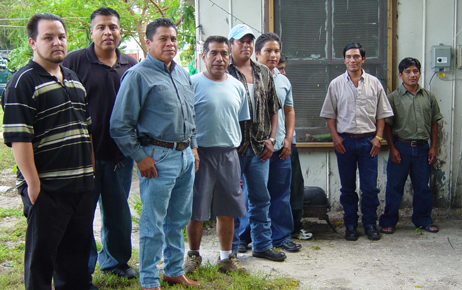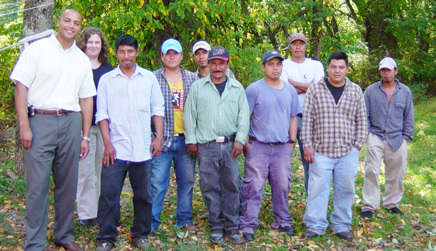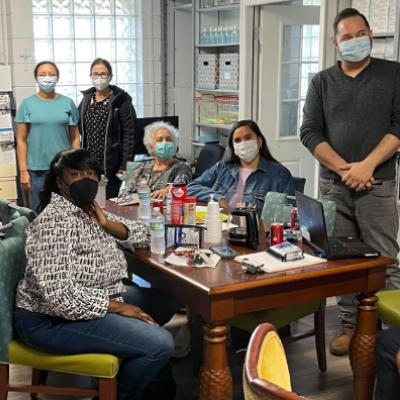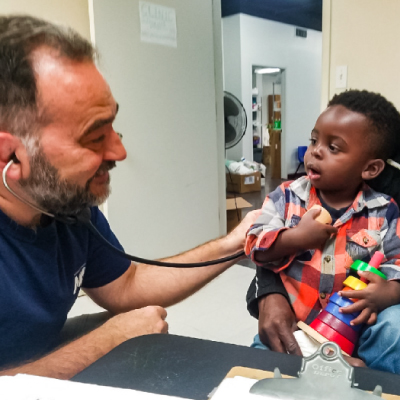- Who We Are
- Clinician Employment
- Publications
- Witness to Witness (W2W)
- Kugel & Zuroweste Health Justice Award
- Your Voice Matters: Photovoice Project
Tue, 10/27/2015 | by Deliana Garcia

 Here we are in the final days of Domestic Violence Awareness Month, during which editorial pages around the country gave some light to the topic we as a society spend a lot of time ignoring. But one critical angle was missing. Here, we won't focus on the one in five -- although we actively work to combat that shockingly high number of women who have been raped in the US. We won’t talk about NFL running backs, world-champion boxers, or well-known actors -- this is a society-wide, everyday people problem, prevalent in every corner of our country and the world. Instead, we at Migrant Clinicians Network take a clinician’s perspective to sexual and intimate partner violence: prevention and early intervention are easier, more effective, and safer for the whole community than rehabilitation. So, we want to talk instead about men.
Here we are in the final days of Domestic Violence Awareness Month, during which editorial pages around the country gave some light to the topic we as a society spend a lot of time ignoring. But one critical angle was missing. Here, we won't focus on the one in five -- although we actively work to combat that shockingly high number of women who have been raped in the US. We won’t talk about NFL running backs, world-champion boxers, or well-known actors -- this is a society-wide, everyday people problem, prevalent in every corner of our country and the world. Instead, we at Migrant Clinicians Network take a clinician’s perspective to sexual and intimate partner violence: prevention and early intervention are easier, more effective, and safer for the whole community than rehabilitation. So, we want to talk instead about men.
At the advice of the hundreds of women with whom we have worked, we went to the men in our communities -- without any presumption that violence has occurred or will occur. The men told us they can be the solution. In our surveys, they wanted to help stop violence against women. They agreed that they can provide support for each other, and that men have the power to change the social acceptance of violence.
So, we created Hombres Unidos contra la Violencia Familiar in 2005, focusing on Latino migrant men, with whom we as clinicians work closely. The five-session curriculum allows these men to learn together about violence and healthy relationships, in men-only small groups led by their peers. They talk about subjects they may have never openly addressed, like gender roles and male socialization, and power and violence. They practice skills to prevent and respond to violence. At their graduation, they promise to act as advocates for violence prevention and plan out how they will prevent violence in their families and communities.
 The men who participate have loved it. One participant noted, “the workshop taught me to face my emotions and control them before reacting… It allowed me to discover new things about family violence, and most importantly, how to avoid it completely.”
The men who participate have loved it. One participant noted, “the workshop taught me to face my emotions and control them before reacting… It allowed me to discover new things about family violence, and most importantly, how to avoid it completely.”
But like many projects past the “development phase,” we can’t find funding for it. The limited monies focused on domestic violence are almost exclusively geared toward emergency shelters, limited transitional housing, and other essential programs to support and rehabilitate the thousands upon thousands of survivors in our country.
To be sure, these services aren’t just extremely needed in our communities -- they too are underfunded. There’s not enough money dedicated to meet the immediate needs of women and men who have experienced and are escaping sexual and intimate partner violence. And we are not advocating that any of the money move from critical response to prevention.
What we need is a new strategy to stop sexual and intimate partner violence. We need funding at all points on the diapason of approaches to stop the harm against people of all walks of life, of all classes, races, and genders. During this Domestic Violence Awareness month, we need to recognize that the solution must come before the violence -- and funding must get to our communities before the violence, too.
Deliana Garcia, MA, is Director of International Projects, Research, and Development at Migrant Clinicians Network. Ms. Garcia is an expert in the field of migrant health and has been working in the area of domestic violence prevention since 1996.
Article also posted on our Medium blog.
Like what you see? Amplify our collective voice with a contribution.
Return to the main blog page or sign up for blog updates here.







